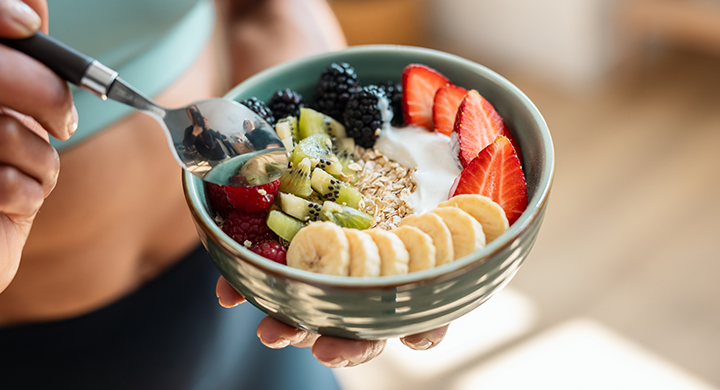
It is a very unpleasant skin disease. It causes a rash, redness, and itching. If eczema is present on visible areas of the skin, it can have a negative impact on a person’s self-esteem. Eczema is common in children (12% suffer from it). But it is also typical for adults. How to deal with it? Adjusting your diet can help alleviate the unpleasant symptoms of this disease. Discover how to enhance your skin’s condition and overall well-being. Here is the best diet for eczema!
How Are Eczema and Diet Related?
This condition is neuroallergic in nature and is often linked to a genetic predisposition. However, it can sometimes be triggered by internal organ diseases, endocrine system disorders, or external factors (working with household chemicals). Sometimes eczema is a consequence of stress. It can be acute or chronic, with periods of exacerbation and remission. It causes a lot of discomfort. But we have good news: there is a solution.
Studies have shown that patients with atopic dermatitis (the most common type of eczema) have an increased risk of developing food allergies. Certain foods can sometimes trigger or worsen eczema symptoms, but they are rarely the primary cause. This doesn’t mean you shouldn’t adjust your diet! Certain foods can exacerbate inflammation and worsen eczema symptoms. Others can help alleviate symptoms. For example, processed foods and foods high in sugar can increase inflammation in the body and worsen eczema symptoms. However, each person’s body is unique. So carefully monitor your reactions to foods. Do you notice that a specific food is exacerbating your eczema symptoms? Consult a doctor.
Healthy Diet for Eczema
Let’s find out what you should add to your daily diet and what you should eliminate.
Eliminate Potential Allergens
Doctors record elevated antibody levels in over 80% of people with eczema. This indicates an allergic reaction. Eczema is often accompanied by allergic rhinitis, asthma, or hay fever.
Experts identify dairy, eggs, peanuts, fish, shellfish, tree nuts, soy, wheat, gluten, citrus fruits, and chocolate as common allergens.
An elimination diet involves gradually eliminating potential allergens. This allows for the identification of triggers. It is important to conduct it under the supervision of a doctor or dietitian. This will help prevent nutritional deficiencies. Also, try a rotation diet. Eat potential allergens every four days. This often reduces the severity of symptoms.
Dyshidrotic eczema can be aggravated by chemical irritants. Be sure to use protective gloves when preparing food.
For some people, gluten can worsen skin and gastrointestinal conditions. Ensure your diet is ideal. A qualified doctor will advise you on how to change your daily diet.
Maintain Gut Health with Probiotics
Bifidobacteria and lactobacilli strains are particularly beneficial. They strengthen the immune system. Gut health is closely linked to immune function, which plays a significant role in the development of eczema. Foods rich in probiotics help maintain a healthy gut microbiome. Try adding yogurt with live cultures, kefir, miso, sauerkraut, kombucha, and tempeh to your diet. A balanced gut microbiome can reduce the risk of allergic reactions and decrease the number of eczema flare-ups.
Follow an Anti-Inflammatory Diet
Inflammation is a major factor in the development of eczema. To reduce inflammation, follow a healthy lifestyle and diet. Sugars and refined carbohydrates raise insulin levels and increase inflammation. Reduce their consumption. If you have a sweet tooth, consider replacing it with natural sweets.
Add whole grains, proteins, and vegetables to your diet. Eat healthy fats, such as those found in fish, nuts, seeds, and flaxseed oil. It is important that you are not allergic to these foods. So, consult your doctor first. If you are deficient in omega-3 fatty acids, take seaweed supplements.
Evening primrose, hemp, or borage oils can help relieve symptoms.
Balance of Vitamins and Minerals
The best diet for eczema patients should include minerals and vitamins. The optimal level of micronutrients helps the skin recover faster. Particularly useful:
- Zinc – seafood, pumpkin seeds, lean meat.
- Vitamin C – citrus fruits, berries, bright vegetables.
- Vitamin E—nuts, seeds, avocado.
- Vitamin D—walks in the sun, and in winter—supplements.
- Flavonoids (such as quercetin) reduce the release of histamine and strengthen the skin’s defenses.
Diets for a Person with Eczema
The Mediterranean diet emphasizes the consumption of fish, olive oil, vegetables, and nuts.
The Ayurvedic diet is also very popular. Nutritionists recommend whole foods and anti-inflammatory spices (turmeric, ginger, and coriander). A gluten-free diet is beneficial for people with gastrointestinal conditions or sensitivities. An anti-inflammatory diet is not only ideal for the skin but also beneficial in preventing chronic diseases. It is typically recommended for people with diabetes and heart disease.
Fatty Fish and Omega-3
The body cannot produce omega-3 fatty acids on its own; therefore, it’s essential to obtain them from food. Salmon, mackerel, sardines, and herring are rich in omega-3 fatty acids. These healthy fats have powerful anti-inflammatory properties. A diet rich in omega-3 fatty acids can reduce itching and redness. Fish oil supplements are available, and under certain circumstances, they can be a great idea. However, it’s best to get omega-3s from whole foods. This is more beneficial and promotes overall health.
Quercetin-Rich Foods
Quercetin is a natural plant flavonoid. It gives fruits and vegetables their vibrant color. This powerful antioxidant helps reduce inflammation and potentially alleviate eczema. Foods high in quercetin include apples, dark berries, cherries, red grapes, broccoli, onions, citrus fruits, and green tea. Add these foods to your daily diet. This is an excellent way to strengthen the immune system and protect against exacerbations of the condition.
Conclusions
Eczema is not only a skin condition; it can also indicate underlying issues in the body. Working with a medical professional to adjust nutrition, use probiotics, add vitamins, incorporate natural care, and avoid allergens may help manage symptoms. It is essential to approach Eczema treatment holistically and under the guidance of a specialist. If you need support, please contact our team to discuss a tailored plan.


